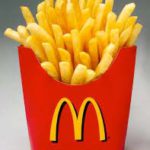 Knowing that flattery is the infantry of negotiations, Octavian, on meeting Antony after a long time, starts the conversation by recounting, for the benefit of the audience, one of Antony’s feats, the fame of which reached even Rome,
Knowing that flattery is the infantry of negotiations, Octavian, on meeting Antony after a long time, starts the conversation by recounting, for the benefit of the audience, one of Antony’s feats, the fame of which reached even Rome,
“…on the Alps
It is reported thou didst eat strange flesh,
Which some did die to look on…”, (1)
a line I am reminded of when seeing someone eating a Macdonald hamburger.
Lest I permanently alienate any or all of my 25 readers, let me say this. I have always thought it the business of those who turn their speculations upon the living world, to commend the virtues and expose the faults of their contemporaries. And to confute a false, as well as to support a just accusation. In the instance,
- The choice of Macdonald is, shall we say, sociological. The company pays millions to the CEO and minimum wage to the employees, not enough to live on. When the matter was brought to the CEO’s attention, he said the remedy is for the employees to apply for food stamps and for whatever other subsidies may be available to the poor. Which is but a public subsidy for a very profitable venture.
- I am a vegetarian, or rather a vegan, for at least 3 decades. I am leery of proselytism, though I may remind the reader that, even in Shakespeare’s time, there was a perception of the detrimental effects of excessive protein accumulation, “… I am a great eater of beef, and I believe that does harm my wit” (2)
- Many elect to ignore the actual ingredients of a hamburger – not to speak of the hormones and antibiotics injected into the animals to promote growth and keep them alive in conditions of permanent torture.
Very briefly, after butchering, meat scraps and sinew are spun in a centrifuge and “washed” with ammonium hydroxide, a chemical used in fertilizers and cleaning products. Out of the centrifuge exits something called “pink slime”. This is said to be used in 70% of ground beef in the United States. But the pink slime does not require inclusion in the ingredients list, because the US Department of Agriculture classifies it as a “process”, not an “ingredient.”
As an expert in the field declared, ”We are talking about a product that would be sold in the cheapest way for dogs, and after this process, is being given to human beings.” - There must be a reason why a recent Federal law made it a crime to document with photos or movies how animals are treated in slaughterhouses. Awareness or visualization of what happens would probably reduce meat consumption and the profits of the related industrial conglomerates.
Finally, I digressed, for I really want to talk about French fries – starting with an event that, for many, may have already sunk into “the swallowing gulf of blind forgetfulness and dark oblivion” (3).
 When the exceptional nation invaded Iraq to assassinate its president, Saddam Hussein, France, at that time, still maintained a flicker of independence and objected to that “humanitarian” invasion. Whereupon the then Republican Chairman of the Committee on House Administration, Bob Ney, renamed the menu item “French Fries”, “Freedom Fries”, in the Congressional cafeterias. An initiative followed and repeated in various parts of the nation.
When the exceptional nation invaded Iraq to assassinate its president, Saddam Hussein, France, at that time, still maintained a flicker of independence and objected to that “humanitarian” invasion. Whereupon the then Republican Chairman of the Committee on House Administration, Bob Ney, renamed the menu item “French Fries”, “Freedom Fries”, in the Congressional cafeterias. An initiative followed and repeated in various parts of the nation.
What’s in a name? A French fry, by any other name… etc. etc. Yes but, whether endowed with frenchness or freedom, a Macdonald fry, in the instance, is not as simple as most of us may think it is.
To begin with, French fries are almost entirely made from a brand of potatoes called “Russet Burbank”. The Burbanks are unusually long and more difficult to grow. But their length ensures delivery of the finished product in small boxes, with the fries fanning out and producing the effect of a bouquet.
However, Russet Burbank potatoes are subject to a condition called “neck necrosis”, brown lines streaking across the tuber, caused by aphids and detracting from the general appearance. Macdonald would not buy the streaked potatoes.
The pesticide used to eliminate the aphids is called “monitor”. It is so toxic that farmers who apply the pesticide will not go into the sprayed field for five days following the application. After harvesting the potatoes sprayed with “monitor”, they are enclosed in huge atmosphere-controlled sheds for six weeks. They are not edible until the gas associated with the pesticide has been expelled.
Now we come to the preparation. Corporate processed food is different from home prepared food. Even corporate French fries are not the same as those that most of us know or would know how to cook. Corporations use large amounts of salt, fat and sugar, much more than anyone would use at home, because the ingredients are attractive, cheap and easily masked in the final product. And when they are layered properly, the combined result is incredibly addictive – though the industry does not use the term addiction, but rather “cravability” and “snackability.”
In the instance, when the French fries reach the franchise, they have already been partially processed and soaked in a solution of sugar and corn-syrup, which gives them the crunchy sweetness, associated with fast-food French fries.
In the end, however, add the inherent calories of potatoes to those of corn syrup, sugar and cooking oil and the combined effect can be easily deducted.
The argument is usually made that fast food franchises are the only opportunity for many to eat affordable food. This is untrue. It is possible to eat nutritious and tasty food at costs comparable or less than fast-food and with minimal effort. But as we know, the greatest part of mankind have no other reason for their opinions than they are in fashion – fashion being dictated by the corporate media and related paid advertising.
Still, given that cooking and nutrition have a bearing on health, a recent school of thought maintains that, on average, a poor woman who cooks has a better diet than a rich woman who doesn’t. Though even experts in the field admit that we still know little about nutrition and about different individuals’ reaction to the same food. Therefore all related information should be taken with the proverbial pinch of salt.
Nevertheless, those who feel they weigh a bit more than they should, before eating food with a high index of “cravability”, may wish to remember the line, “… dainty bits make rich the ribs, but bankrupt quite the wits”(4)
1) Antony and Cleopatra
2) Twelfth Night
3) King Richard III
4) Love’s Labours Lost
